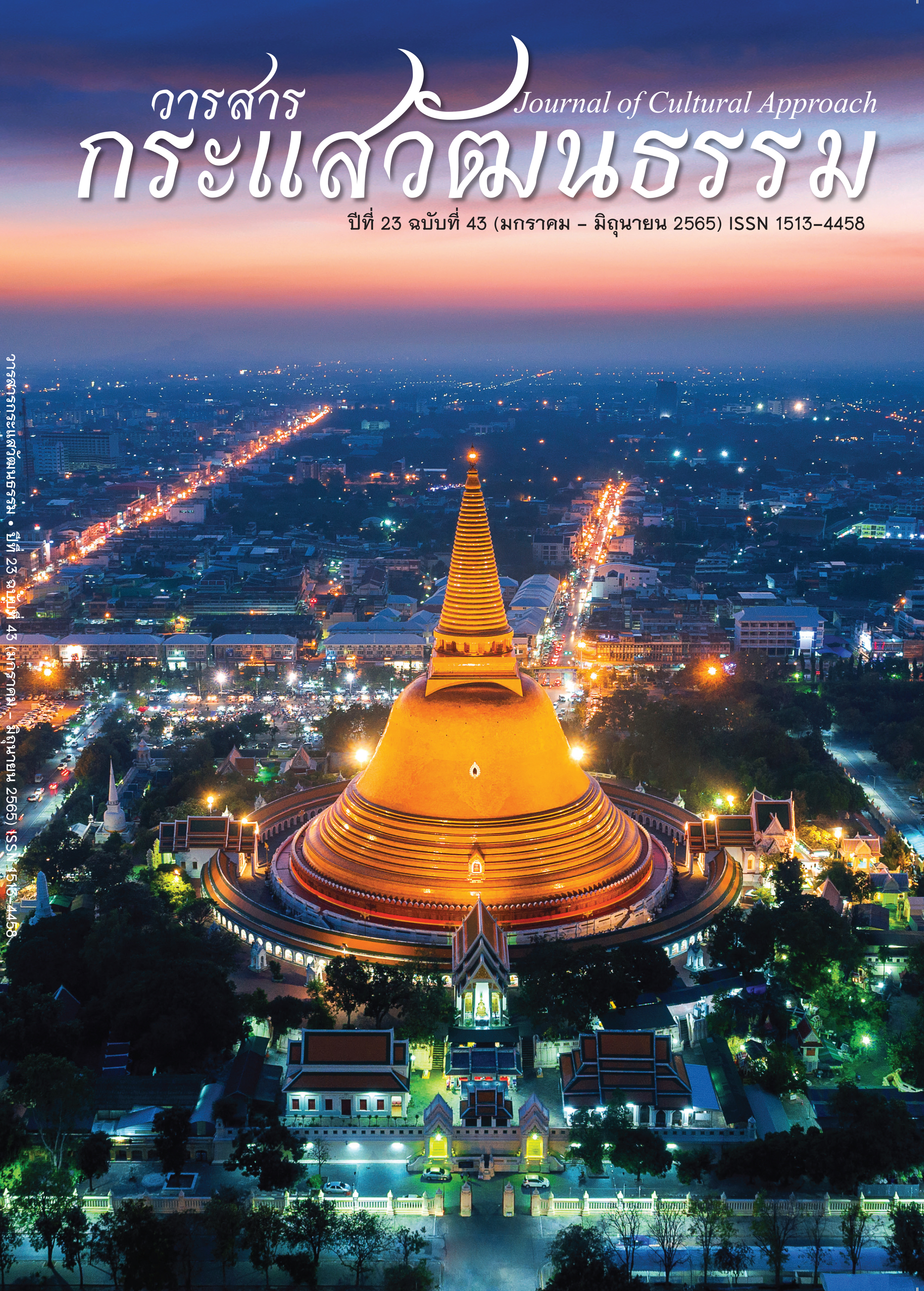Guidelines for the Transmission of Cultural Values and Collective Identity : Chili Pastes of Southeast Asia
Main Article Content
Abstract
The purpose of this research are 1) to analyze the values and collective identity associated with the Southeast Asia’s chili pastes; 2) to analyze the cultural inheritance; and 3) to present guidelines for the transmission of Southeast Asia’s cultural inheritance. The scope of this research focuses on chili pastes uses as dips: Namprik in Bangkok, Thailand; Jeawbong in Luangprabang, Laos; and Tik Kreoung in Phnom Penh, Cambodia, as case studies. The research methods include documentary research, interviews with chili paste and food culture experts, and field research in the corresponding areas. The interviews were in-depth and semi-structured. The key informants were divided into three groups: academics, community leaders, and community members who continued producing the chili paste. There were a total of 60 interview participants, which were comprised of 15 participants in Thailand, 15 participants in Laos, and 30 participants in Cambodia. The analyzed data was used for drafting, reviewing and presenting the guidelines for the transmission of cultural values and collective identity of Southeast Asia’s chili pastes.
The research resulted are as follows: 1) the values and collective identity associated with Southeast Asia’s chili paste were found and divided into five areas: (1) history reflecting the identity of Southeast Asian roots; (2) aesthetics reflects a minimalist identity; (3) ethics reflecting on identity of love and care; (4) wisdom reflecting harmonization with nature; and (5) a way of life reflecting Southeast Asian living practices.
2) The cultural inheritance of values and collective identity associated with Southeast Asia’s chili pastes is transmitted through lifelong learning, which is a combination of formal education (vocational schools and universities), non-formal education (restaurants and cooking schools), and informal education (learning through direct experiences in households and communities.
3) The guidelines for transmission of cultural inheritance should focus on the family unit as a fundamental platform for integrating intangible cultural heritage into lifelong learning. A person who takes care of a child is the key to success of passing on this taste of wisdom through everyday practices.
Article Details

This work is licensed under a Creative Commons Attribution-NonCommercial-NoDerivatives 4.0 International License.
Proposed Creative Commons Copyright Notices
1. Proposed Policy for Journals That Offer Open Access
Authors who publish with this journal agree to the following terms:
- Authors retain copyright and grant the journal right of first publication with the work simultaneously licensed under a Creative Commons Attribution License that allows others to share the work with an acknowledgement of the work's authorship and initial publication in this journal.
- Authors are able to enter into separate, additional contractual arrangements for the non-exclusive distribution of the journal's published version of the work (e.g., post it to an institutional repository or publish it in a book), with an acknowledgement of its initial publication in this journal.
- Authors are permitted and encouraged to post their work online (e.g., in institutional repositories or on their website) prior to and during the submission process, as it can lead to productive exchanges, as well as earlier and greater citation of published work (See The Effect of Open Access).
Proposed Policy for Journals That Offer Delayed Open Access
Authors who publish with this journal agree to the following terms:
- Authors retain copyright and grant the journal right of first publication, with the work [SPECIFY PERIOD OF TIME] after publication simultaneously licensed under a Creative Commons Attribution License that allows others to share the work with an acknowledgement of the work's authorship and initial publication in this journal.
- Authors are able to enter into separate, additional contractual arrangements for the non-exclusive distribution of the journal's published version of the work (e.g., post it to an institutional repository or publish it in a book), with an acknowledgement of its initial publication in this journal.
- Authors are permitted and encouraged to post their work online (e.g., in institutional repositories or on their website) prior to and during the submission process, as it can lead to productive exchanges, as well as earlier and greater citation of published work (See The Effect of Open Access).
References
ASEAN Secretariat. (2016). ASEAN Socio-Cultural Community Blueprint 2025. N.P. : Jakarta.
Department of Academic. (2015). Food and Food Culture in ASEAN. Bangkok : Sataporn Book.
Department of Cultural Promotion. (2016). Culture, Way of Life, and Wisdom. Bangkok : Rungsilp Printing.
Department of Public Relations. (2018). ASEAN News and Information, Guidelines of ASEAN Identity for ASEAN Socio–Cultural Community. Retrieved from http://thailand.prd.go.th/1700/ewt/aseanthai/ewt_news.php?nid=4502&filename=index
Kongpun, S. (2018). Food Lists of National Intangible Cultural Heritage. Bangkok : Thai Health Promotion Foundation.
La Loubère, S. (2005). Du Royaume de Siam. Nonthaburi : Srithanya.
Lakkham, S. et al. (2014). Survey Report on Intangible Cultural Heritage : Namprik (Part 1). Retrieved from https://drive.google.com/file/d/0Bwl1NSseUsxYMzUwOTE4bjA1d00/view
Lea–lamai, K. (2017). Oshagale. Bangkok : Way of Book.
Ministry of Education. (2015). ASEAN Education Strategy. Bangkok : Amarin Printing and Publishing.
Mitrsuriya, R. (2014). ASEAN History of Southeast Asia. Bangkok : Gypsy.
Paramanusit, N. (2013). Osha–Asian. Bangkok : Matichon.
Princess Maha Chakri Sirindhorn Anthropology Centre. (2017). Heritage of the Nations : Lesson Learned from the Neighboring Countries. Bangkok : Princess Maha Chakri Sirindhorn Anthropology Centre.
Ramitanon, C. & Vechanont, S. (2008). Namprik Boiled Vegetable, and ASEAN Food. In Kasetsiri, C. (Ed.), Seminar Document Salween River-Mekong : People, River, and ASEAN Suvarnabhumi. Bangkok : the Social Sciences and Humanities Textbooks Foundation.
Royal Institute. (2013). The Royal Institute Dictionary 2011. Bangkok : Royal Society of Thailand.
Wongthai, N. (2016). The Study of Chilipastes in 4 Regions in Thailand : the Reflection of Thai Way Living and Culture. Journal of Humanities and Social Sciences, 8(16), 88–100.
Wongthes, S. (2016). Common Cultural in ASEAN. Bangkok : Natahak.


